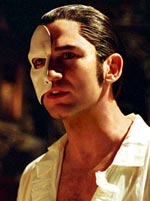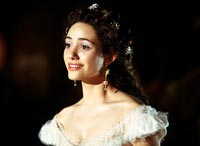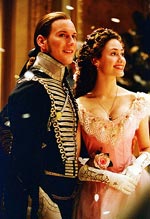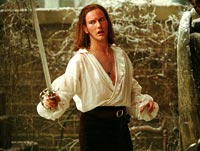 |
For fans like myself, it’s been a long 18-year wait for a cinematic adaptation of Andrew Lloyd Webber’s The Phantom of the Opera, one of the most successful stage musicals of all time with an original cast recording that’s sold more than 40 million copies since 1987. The tagline for the new movie is chuckle-worthy, however: “The classic musical comes to the big screen for the first time.” It ensures people understand what this particular version is like, but “first” also suggests that there may be future film adaptations of the musical. Judging by this one, that might not be a bad idea.

For the unfamiliar, the musical Phantom is loosely adapted from Gaston Leroux’s classic novel of the same name. Primarily set in an 1870 Paris opera house, the story centers on Christine Daae (Emmy Rossum), a young and innocent chorus girl who longs to become a leading opera singer, but is unable to rise above the arrogant preening of soprano diva Carlotta (Minnie Driver). All of that begins to change through the tutelage and aid of a mysterious and romantic “Angel of Music,” none other than The Phantom (Gerard Butler), a mysterious masked presence lurking among the shadows of the theatre. When dashing patron Raoul (Patrick Wilson) enters the picture to compete for Christine’s heart, it sends The Phantom into a jealous rampage, letting nothing stand in his way to advance the beauty’s rise to stardom and win her love.
Lloyd Webber produced this film, selecting Joel Schumacher as director because of his work combining visuals with music in (no joke) the 1987 comedic teen -vampire thriller The Lost Boys. Schumacher does have experience directing music videos and a penchant for visual opulence, so he would seem an ideal choice, with the deceptively easy task of putting the heralded musical on screen and enhancing it with movie magic. As long as he doesn’t dramatically alter it, how can he fail?

Recall that Schumacher also has a reputation for favoring style over substance—this is the same man who derailed the Batman film franchise in the mid-’90s with Batman Forever and Batman & Robin, opting for flashy colors and camp over sensible dialogue and suspense. To Schumacher’s credit, this Phantom looks and sounds great. The set design and costumes are gorgeous and Oscar worthy, the cast is attractive, and the breathtaking musical score has been (mostly) preserved.
Still it falls short of other great movie musicals, though in fairness to Schumacher, Phantom is not as simple as throwing the theatrical production on screen. The stage allows imaginative liberties that don’t translate well to film. Also, unlike the classic musicals of yesteryear and the recent Best Picture winner Chicago, most of Phantom doesn’t benefit from choreography and action to hold the audience’s attention during musical numbers, leaving us with several scenes of actors singing to each other with long lingering gazes.
That’s exactly where the director needs to step in to find a way to carry the story on film with beauty and intelligence—Schumacher and Lloyd Webber only get it half right with their screenplay. A montage of shots and images help establish setting, but they don’t necessarily tell the story. The best movie musicals, like Chicago, find a way to translate the drama on screen, not simply dress it up.

A perfect example is the scene for “Wishing You Were Somehow Here Again,” a sweet and haunting aria by Christine longing for the comfort of her deceased father. Here’s an ideal opportunity to see the character reminisce over the paternal bond of her youth essential to the story. Instead, Schumacher has Christine walking aimlessly through a graveyard with gothic angel statues and a light snowfall before eventually arriving at the mausoleum for the song’s end. A beautifully shot music video, but it’s all style over storytelling.
Worse is the campy, ’80s styled music video sequence for the title song, which isn’t helped by the dated sounding drum machine. This was originally an inventive bit of staging that recreated a descent through darkly lit tunnels and a gondola ride into the opera house catacombs. In the film, the Phantom and Christine travel a brightly lit hallway, leading to a horse to carry Christine for part of the way. Who else but that romantic Phantom would think to keep a horse in the basement for such a short trip? The ensuing boat ride looks more like the Pirates of the Caribbean theme park attraction, reducing a musical highlight to a cinematic embarrassment.
Additionally, the “Notes” scene was one of the show’s funnier bits with characters musically interacting like an old-time comedy. Here it’s stiff with almost no sense of fun as characters sing their lines without really interacting. “Prima Donna” comes off with similar coldness, as Raoul and ballet mistress Madame Giry (Miranda Richardson) are shown storming through different venues singing their lines to no one in particular. Purists might also take note that the Act II’s “Notes” sequence has been largely cut, and several sung passages are now spoken in conversational rhyming, sounding more campy as a result.

Which suggests that Schumacher and Lloyd Webber don’t believe the average filmgoer is quick enough to catch the story through sung lyrics as originally intended. How else to explain the badly written dialogue added for the movie? Towards the film’s beginning, Christine points out Raoul to a friend: “You could say we were childhood sweethearts. He used to call me Little Lotte.” The lovers’ past relationship is alluded to in two other conversations before they meet and reveal the same details all over again. In the same way, we’re endlessly reminded up front that Christine believes the Phantom to be the Angel of Music that her father promised to send from on high when he died. Does everything need to be spelled out so obviously?
There are still some delightfully crafted musical numbers in the film. Schumacher’s campy tendencies work naturally in the comedic opera parody “Poor Fool He Makes Me Laugh,” and scenes where the Phantom lurks about during performances are also effective in creating tension. “All I Ask of You,” the film’s romantic centerpiece, is nearly perfect in mood with the rooftop setting, falling snow, sweeping music, and loving gazes.
Additions to the movie include some silly action scenes intended to make Raoul seem more swashbuckling. Neither the hall of mirrors nor the water trap are the least bit suspenseful, and while a swordfight with the Phantom in the cemetery begins as a smart alternative to the fireballs from the stage, it ends too abruptly as if the filmmakers didn’t know how to resolve it. There’s also a badly overdone back-story involving the Phantom’s childhood as a carnival sideshow attraction, designed to elicit sympathy.
As for the actors, the filmmakers deserve credit for selecting untested talent capable of filling some challenging roles. Emmy Rossum is especially impressive—absolutely stunning and beautiful, capturing the innocence and naïveté of Christine while convincingly running through an array of emotions. As a trained opera singer, she sings the part well (and it’s hard to believe she was born the same year the musical originally debuted). Patrick Wilson is also in fine voice, having played Curly in Oklahoma! on Broadway. He does the best he can with a role that screams Dudley Do-Right. Driver has a lot of fun hamming it up as Carlotta, though it’s a little much at times. She’s the only actress who (understandably) doesn’t sing her own part, though as a consolation, she has the honor of singing “Learn to Be Lonely” (the single new musical contribution) over the end-credits.
What of the Phantom? Butler’s singing is adequate, though he’s not what you’d hope from the leading man, occasionally scooping his notes. He’s also miscast in that he’s too young and handsome for the role, which keeps his love for Christine from ever feeling too creepy. Butler plays the part simply as a tortured soul, without any of the crazed madman heard on stage (i.e. no maniacal laughter). Michael Crawford, the original Phantom, could easily out-act Butler using only his voice.
Which gets to the film’s greatest shortcoming. The thrills and mystery of the musical are virtually eliminated. On stage, it was unclear whether or not the characters were dealing with the supernatural. In this, there’s no question it’s a grumpy and isolated man with a grudge and lots of gadgets—not unlike Batman. He’s never scary in this movie, even when unmasked, and all the surprises from the musical are either telegraphed from miles away or cut altogether.
All to say that The Phantom of the Opera is not without its strengths and charms, but it lacks subtlety and grace, failing to enchant or enhance. It’s a clumsy adaptation overly fixated on the beauty of its set design and charisma of its stars—one of the greatest musical scores of the 20th century set to lots of pretty things to look at. Most fans are bound to be disappointed to some degree, and non-aficionados of musical theater will find it tedious and silly. Do yourself a favor and see this on stage. Or else do what so many others have done—buy the soundtrack, let “The Music of the Night” surround you, and dream of what it could be like … or in this case, what might have been.
Talk About It
Discussion starters- The Phantom loves Christine, but Raoul is in love with her. Consider the difference, and contrast Christine’s feelings to both men.
- What does the story have to say about our universal need to be loved and the transforming power of being loved by another? How do we express love to others? How do we mistakenly express it?
- What about pride? Carlotta, the other opera singers, the theater owners, and even the Phantom suffer because of their arrogance in their abilities. How does Christine (and Raoul to a lesser extent) contrast with their personalities and motivations?
The Family Corner
For parents to considerPhantom is rather unfairly rated PG-13 for brief violent images; perhaps the filmmakers wanted to avoid marketing this as a family movie that’s too childish for adults. (The PG-rated Harry Potter, Lemony Snicket, and Star Wars are all more violent than this.) In addition to the few strangulations from the original theatrical production, there’s a swordfight that yields a minor cut. The Phantom’s disfigurement will only scare the smallest of children. But as long as we’re going to be oversensitive, it may as well be noted that some of the opera choreography is a bit sensual, and a stagehand shows his “full moon” to the film audience.
What Other Critics Are Saying
Andrew Lloyd Webber’s blockbuster Broadway sensation The Phantom of the Opera has finally been translated to the big screen. But in spite of the enthusiasm that has been building for the release of a Phantom movie for years, this one arrives to a rather unspectacular critical reception.
Russ Breimeier (Christianity Today Movies) says, “The Phantom of the Opera is not without its strengths and charms, but it lacks subtlety and grace, failing to enchant or enhance. It’s a clumsy adaptation overly fixated on the beauty of its set design and charisma of its stars—one of the greatest musical scores of the 20th century set to lots of pretty things to look at. Most fans are bound to be disappointed to some degree, and non-aficionados of musical theater will find it tedious and silly. Do yourself a favor and see this on stage.”
Josh Hurst (Reveal) says, “Halfway through [it] … I still had no idea whether it was meant to be a comedy or a tragedy. The film jumps from exaggerated, live-action cartoon mode to dark, brooding drama mode so abruptly that it’s liable to give some viewers whiplash. Unfortunately, this major identity crisis isn’t the film’s only misstep. Everything from the acting to the music to the writing falls flat.”
“On the whole the movie isn’t bad, but it could have been stronger,” says Bob Smithouser (Plugged In). “For starters, the Phantom himself is a disappointment. [Gerard Butler’s] singing voice isn’t up to the task, bailing out on notes with a slight rock-star bark that sounds out of place among a cast of very gifted, classically trained vocalists. [Emmy] Rossum [as Christine] seems stifled and passionless.” Still, he personally finds the story to be “a meaningful parable.”
Michael Elliott (Movie Parables) writes, “The screen version reminds us of the intense passion to be found in the stage play but it fails to match it. All of the elements are there—the classic story … the huge chandelier; the disfigured titular character; and, of course, the haunting score by Andrew Lloyd Webber. It is just that some secret ingredient that made the live production so emotionally overwhelming is missing.”
Daniel Revill (Relevant) is also let down. “Much to my disappointment it was everything that I feared it would be: flat and not very entertaining.”
But Harry Forbes (Catholic News Service) calls it “a faithful and eye-filling re-creation of the worldwide stage hit … mostly absorbing, in spite of unremarkable leads and unconvincing lip-syncing that undermine some of the drama. In spite of some longueurs, the film is quite entertaining, and joins the Chaney version as the most faithful onscreen telling of Gaston Leroux’s original novel.”
And Denny Wayman and Hal Conklin (Cinema in Focus) write, “Though dark in content, this is a classic tale that is powerfully and beautifully presented both visually and musically.”
Copyright © 2004 Christianity Today. Click for reprint information.












